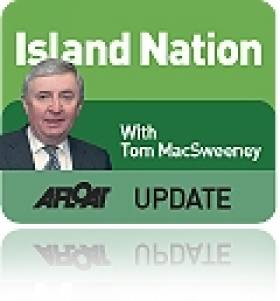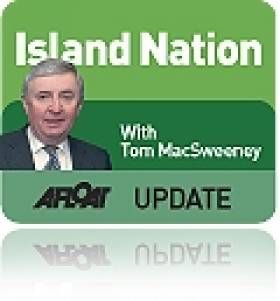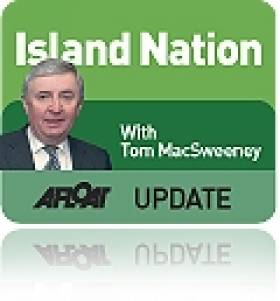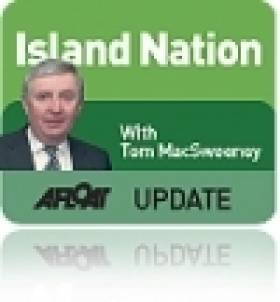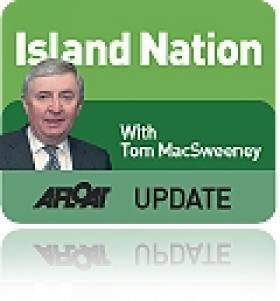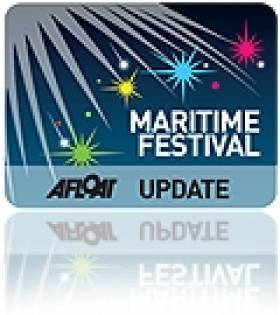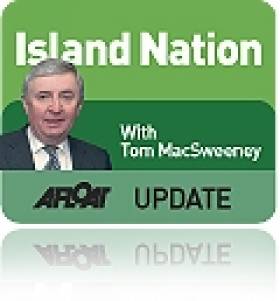Displaying items by tag: maritime
Labour Manifesto Leads the Way on Irish Maritime Affairs
Fine Gael has told Afloat.ie details of its marine policy will be published in its manifesto tomorrow. If that's the case things are looking up for anyone interested in seeing Ireland develop the valuable waters that surround it.
After searching for references to 'sea', 'marine' or 'maritime' only the Labour party has so far made the only significant written commitment to the marine sector in its programme for government. Its manifesto acknowledges that Coastal Communities, Fisheries and the Marine face major challenges in the years ahead, but it is also an area of major economic potential.
Fianna Fail merely says on page 21 of its manifesto that it will ensure that 'an inter-departmental strategy is in place to improve the leisure potential of our harbours and increase marine tourism'.
The Green Party 'Renewing Ireland' document says it will promote the creation of marinas and youth and child friendly water sports to encourage activity and awareness of our maritime country. It also says Ireland will participates in the North Seas Offshore Grid Plan.
There is no reference to the marine in the Sinn Fein 'There is a Better Way' manifesto.
Four party manifestos are available to download below.
Labour's priority will be to develop Ireland as a European hub for seafood processing, which will create sustainable, value-added jobs in coastal communities.
Labour will also develop an Irish seafood strategy to grow the market profile and demand for Irish seafood products. We will support the development of sustainable aquaculture and fish farms by streamlining the licensing process and reducing, as much as possible, the associated bureaucracy. To further assist the development of the sector, responsibility for maritime policy will, as far as is practicable, be concentrated in one department.
Labour will establish a Sea Fisheries Sustainability Impact Assessment based on consultation with all major stakeholders. This report will be brought before the Dáil on an annual basis before EU fisheries negotiations commence, and will ensure that there is a regular evaluation of Irish fish stocks and the effectiveness of current policy and quotas.
Labour is open to the experience and expertise of those whose livelihoods depend on maritime activity. The Department of Agriculture, Fisheries and Food will engage in an ongoing structured consultation with industry representatives, the marine scientific community and other stakeholders to enable them to contribute to national maritime policy.
Finally, safety at sea and decent working conditions must underpin the development of the fisheries sector. Labour in government will ensure that the Irish Coast Guard has access to an Emergency Towing Vessel.
Dun Laoghaire People before Profit candidate Richard Boyd Barrett who has campaigned under a 'Save our Seafront' banner in the last council elections, is holding a meeting tomorrow night in Dun Laoghaire, the country's largest boating centre to protest against the possible 'privatisation' of the town's harbour.
We're tracking the progress of maritime affairs in the general election and posting details on afloat.ie. Whether you're a candidate or a vote please get in touch with your #ge11 marine news. Contact us via facebook, twitter or our website.
Would You Pay to Watch Sailing?
There are those who don't like sailing – and even some in the sport itself – who have described watching a sailing race as "about as interesting as watching paint dry. While exciting pictures have been available from the Volvo Round the World Race and match racing has proved watchable, these were exceptional highlights compared with the more mundane aspects of yacht racing. Raising public interest in the sport has been a permanent difficulty.
The Olympic Games have fared no better. The last Olympics in China were difficult for sailing where the racing was not regarded as of sufficiently high quality, courses were perceived as often poor and there were even difficulties in finding enough clear water at times due to silting and other problems.
With tickets due to go on sail in two month's time for the London Olympic Games in 2012, controversy is flaring over a decision to impose charges to watch sailing.
The 2012 Games will be the first in Olympic history to charge spectators for sailing races, with temporary seating being provided for up to 4,600 paying customers at Weymouth's Nothe Gardens, a local beauty spot which overlooks one of the racing areas at Newton's Cove. Weymouth and Portland Council received official notification about the plan a week before Christmas. This was more than two months after the London organising committee, Locog, announced ticket prices for the Games, including sailing.
The spectator experience at previous Games has been confined to a glimpse of sails through a pair of binoculars, but by bringing the action close to shore, Locog believes it can turn sailing into an exciting spectator sport.
They are hoping that ticket sales will be encouraged by the introduction of new events such as women's match-racing — a series of 20-minute head-to-head races between two boats. This will begin with a round-robin phase before turning into a knockout competition and is intended to form the core of the programme on the Nothe course. It will be supplemented by races involving two of what are regarded as spectacular classes - including the 49ers and the windsurfers.
In the second week of the Games, the course will play host to the final medal races in all boat classes.
This concept of bringing the sport to the fans onshore has the full backing of the International Sailing Federation, which will be hoping for capacity crowds in the temporary stands, where spectators will be asked to pay up to stg£55 each to watch the sailing.
However, local people in Weymouth and Portland are angered by the intention to turn their public park into a ticketed venue. The Council has accused the organisers of not discussing their plans in advance and local councillors claim people are outraged that they will be barred from the park for several weeks.
Locog has defended its decision to sell tickets, saying that, for the first time, sailing will be presented as a true onshore spectator experience, which the International Sailing Federation is keen to develop. The organisers also cite safety concerns, with a ticketed venue allowing them to predict crowd numbers. They insist the move is not motivated by financial gain, but that is, clearly, being questioned.
For those unwilling to pay, there will still be one or two free vantage points near Newton's Cove as well a free site with a big video screen and stage on Weymouth Beach.
Sailing competitions will take place on five courses but only at Newton's Cove will spectators be able to watch from land with the naked eye. Tickets, which will go on sale in March, will range from stg£20 for preliminary races to stg£55 for medal races. Discounts will be offered for children and over-60s.
Locog said councillors were invited to a meeting about Nothe Gardens in October. It added that there would be a public consultation later this year prior to submitting a formal planning application for the use of the park for charged viewing. It will be interesting to see how the Council reacts to that application!
One thing the controversy is doing is, at least, is to highlight the sailing events!
• An interesting sidelight about public interest in sailing is that, while sailing has difficulty in getting television coverage, a total of 506,000 people watched USA TV personality, Oprah Winfrey and the star of the film, 'Master and Commander,' Russell Crowe when they presented a sailing programme from Sydney Harbour.
- This article is reprinted by permission of the EVENING ECHO newspaper, Cork, where Tom MacSweeney writes maritime columns twice weekly. Evening Echo website: www.eecho.ie
Giving Away a Billion from the Sea
I had to read the figures twice to make sure that I was seeing them correctly. The second reading made me even more angry than the first.
They were, at last, a definitive figure of how much the stupidity of Irish politicians and the ignorance and disregard of the maritime sphere by the Government have cost this nation – over a billion Euros in one year.
There is no way the Government can weasel its way out of this revelation, nor any excuse the un-named civil servants responsible can make to avoid the accusation that this is a massive economic waste.
The Marine Institute is the Government's own respected authority on maritime affairs, the voice of the State on marine research and it has valued the total available catch of fish off Ireland last year at €1.18 billion, for a total of 994,155 tonnes.
That is an enormous figure, indicating huge potential wealth for this cash-strapped nation in the middle of an economic disaster. But of this total value of seafood, Ireland was only entitled to catch €0.19 billion. Foreign fishing fleets had exclusive rights to take the rest of the fish from Irish waters.
No wonder I had to read the figures a second time to make sure I was seeing them correctly at a time when the value of our food exports has been shown to be one of the top earners for the nation. How much more could have been earned if Irish fishermen could catch all that fish and have it processed in Ireland, creating onshore jobs in ancillary businesses as well as at sea?
The total value for 2010 could be even higher than €1.18 billion because the Institute prepared its figures in advance of the annual fisheries negotiations in Brussels in December. Ireland as a nation and the country's fishing industry in particular are likely to have lost out even more heavily to other EU countries.
Effectively, Ireland handed over around €1billion of its natural economic resources to other EU countries. Mark McCarthy, Editor of The Marine Times, the national fishing industry paper, described the figures as "truly frightening."
"This is a nation with some of the richest fishing grounds in the world where the coastal communities are being financially starved and frustrated through their inability to catch their own fish, because they are not allowed to do so."
It is hardly any wonder that Irish fishermen, forced to tie up their boats at the quaysides of Irish fishing ports and watch as foreign vessels unload into those ports, are bitter and frustrated.
Ebbie Sheehan of Castletownbere, Chairman of the Irish Fishermen's Organisation, asks why fishermen are "so badly treated when we look at the economic situation today?"
The Marine Institute, our national maritime scientific and research organisation, says that its estimate of the value of fishing opportunities in Irish waters is "conservative" and that, in order to prepare the figures in early December, it based them on 2009 values
That would make the total value even higher and the Institute pointed out that of the total catch of 994,155 tonnes, Ireland's fishermen were entitled to take only 18 per cent of the catch. This was only 16 per cent of the total value.
"These figures exclude valuable inshore fisheries, such as lobster and whelk which are not currently managed by total allowable catches within the Common Fisheries Policy," the Institute pointed out.
As Mark McCarthy described it, when one considers the importance of using our natural resources for the benefit of Irish people and the failure of our political leaders to see and understand this, what has been revealed is "truly frightening".
- This article is reprinted by permission of the EVENING ECHO newspaper, Cork, where Tom MacSweeney writes maritime columns twice weekly. Evening Echo website: www.eecho.ie
How Many Times Do I Have to Say the Sea is Vital to Ireland?
Ireland has the largest maritime area-to-land mass in the European Union, but derives only 1% of GDP from the maritime sector. At a time when the economy needs every benefit it can get this figure is startling, particularly when compared to countries with other extensive coastlines, such as Norway where the figure is 20%, Denmark where it is 11% and even the UK which has increased its figure to 5%.
Despite being an island nation with a strong dependency on the sea, the Irish maritime economy is still in its infancy, both in terms of investment and of recognition.
Once again the importance of the sea was shown in the pre-Christmas weather problems. When air transport again failed the public, the ferries continued to operate. When road transport needed salt for gritting to keep roads open, it was ships which brought the salt to Ireland.
How many times do I have to challenge the ignorance and stupidity of the State, of Government, towards the sea? How many times do I have to remind the public of how dependent we are on the sea as an island nation?
Though still considered a low priority by Government, the maritime sector is worth €3 billion to the nation and supports 440,000 direct and indirect jobs. According to the Marine Institute in the "SeaChange Programme," this could be increased by at least 50%.
In Cork the Coastal and Marine Resources Centre which is part of UCC's Environmental Research Institute and has been working out of the Naval Base on Haulbowline Island has changed its name and is planning to move to a new maritime research facility. It has become the "Coastal and Marine Research Centre".
For over ten years the CMRC has been promoting the use of integrated coastal zone management as a means of achieving sustainable development in the use of coastal and marine resources, including marine ecology, seabed mapping, coastal processes, remote sensing, geology and geomatics.
A new maritime research facility is planned at Ringaskiddy, adjacent to the National Maritime College, part of the announced intention to establish a Maritime and Energy Research Campus and Commercial Cluster. The Department of Communications, Energy and Natural Resources, Bord Gais and the UCC Glucksman Foundation contributed funding, together with €7.5m. from the Higher Education Authority. As part of the National Ocean Energy Strategy, it will "bring together on one site the people, their ideas and the infrastructure to support the development of ocean energy," according to MERC Chairman, Peter Coyle. "Our aim is to produce innovative technical solutions to support the development of the Irish maritime sector."
This will include ocean energy opportunities, such as wave power where Irish companies have been leading the way. Shipping, logistics and maritime transport, marine recreation, maritime security research and maritime space applications are amongst other aspects of research work to be undertaken in Ringaskiddy.
Valerie Cummins, who led the Coastal Marine Resources Centre over past years has been appointed Director of MERC and is being replaced as Director at the newly re-named Coastal and Marine Research Centre by Jeremy Gault.
This article is reprinted by permission of the EVENING ECHO newspaper, Cork, where Tom MacSweeney writes maritime columns twice weekly. Evening Echo website: www.eecho.ie
‘Follow the Fleet’ Essay Competition Reminder
Schools can register details by logging on the webite where a username and password will be provided. All details with essay guidelines, entry forms and competition details and rules are available on www.imdo.ie/followthefleet/news.asp
Remembering Seafarers Who Saved the Nation
City Quay in the centre of Dublin can be a cold place when the wind whips upriver from the open sea.
There was a 'bite' in the wind as I stood there in late November last year, recording the sounds of remembrance. Men, women and children stood in front of a monument where, on most days, traffic pours past and the great majority of people in those vehicles may not realise they are passing a hallowed spot which remembers men without whom this nation would have ground to a halt. This nation may be in a state of "economic war" at present, it was in a real state of war when those men died.
Every year, on the second last Sunday of November, this gathering takes place, when the men of the Irish mercantile marine who lost their lives at sea during the Second World War are remembered. Mass is celebrated in the City Quay Parish Church. Then there is a short walk to the Seamen's Memorial where wreaths are laid. That is followed by tea, coffee and a chat in the parish hall where it is a time of memories for former seafarers and their families. Friendships are renewed as the "family of the sea" gathers. In the afternoon, there is another Memorial Service St. Patrick's Cathedral.
These are poignant occasions which, in recent years, have been extended to embrace, remember and honour all Irish seafarers who have died at sea. The Maritime Institute of Ireland organises the event. Its Cork Branch also holds a remembrance service in November.
The month of November is an important one in the history of Irish maritime affairs.
It was on November 14, 1984 that the then Irish Government, a Fine Gael/Labour Coalition delivered a shattering blow to the Irish maritime industry. They put the national shipping company, Irish Shipping, into liquidation.
Those who took that decision have since put distance between themselves and the maritime sector. Garrett Fitzgerald was Taoiseach; Alan Dukes was the Minister for Finance in the Fine Gael/Labour Coalition Government which made that controversial decision, putting the first Irish State company into liquidation. Seafarers who had rallied to the call to help save the nation when the company was set up in World War Two were abandoned to their fate. Politicians did not want to remember that, at a time when neutral Ireland was being denied vital supplies by warring nations, seafarers saved the nation from disaster. The politicians who ruled the nation in 1984 abandoned them.
Shortly after they abandoned Irish Shipping, the Government was quick to rescue Allied Irish Banks and protect shareholders over the consequences of rash investment in insurance. Banks were more important than seafarers. It seems that not a lot has changed today in the attitude the Government takes towards banks, in comparison with the way it treats the people of this island nation.
• The Annual National Commemoration Services for Irish Seafarers will be held at 11.30 am this Sunday, November 21, in the Church of the Immaculate Heart of Mary, City Quay, Dublin. Wreaths will be laid afterwards at the Irish Seaman's National Memorial on City Quay. There will also be a memorial ceremony of Evensong at 3.15 pm in St. Patrick's Cathedral, Dublin.
• This article is reprinted by permission of the EVENING ECHO newspaper, Cork, where Tom MacSweeney writes maritime columns twice weekly. Evening Echo website: www.eecho.ie
READ MORE ISLAND NATION BLOGS HERE
An Irish Maritime Foundation
I wonder whether there might be interest in forming an Irish Maritime Foundation?
I raise the question having discussed the possibility with those who run the UK Maritime Foundation and whose views about the sea about the sea impressed me when I met them in London. The Foundation traces its history back to 1981 when shipowners, senior retired naval officers and people involved in the financial industry reacted to changes in British Government policy that were regarded as failing to protect the importance of the UK maritime industry. It is a registered charity with the purpose of promoting and raising interest in the maritime sector amongst the public, the media and Parliament. To do so it is involved in assisting development of maritime education, training and research.
The British are a magnanimous people in my view. It was an honour to accept the Desmond Wettern Award from the Foundation. Desmond Wettern was a distinguished UK maritime journalist for over 30 years and the awards were established in his name. This year the Society for Nautical Research joined the awards project.
In responding I used one of my favourite descriptions - "the Family of the Sea," which I have used on radio. It drew a lot of interest from those present. I believe there is a "family of the sea" which spans oceans and seas, linking those who appreciate the sea as essential to human survival.
"Everyone who has an interest in the sea would recognise that there are and will continue to be, increasing pressures on its use and on the exploitation of its finite resources, but also a number of opportunities," according to Rear Admiral Christopher Perry, Chairman of the UK Marine Management Organisation. Those views and others I discussed with some of those amongst the 200 attending the function, who came from various parts of the world. Professor Richard Harding of the Society for Nautical Research which is marking its centenary, expressed this opinion: "There is a disturbing sense of sea-blindness in the British Government, amongst the general public at large and in the media."
There is certainly sea-blindness in our Government and in much of the media, though I am hopeful that there is growing awareness of the importance of the marine sector amongst the general public. If Ireland had an organisation like the Maritime Foundation, I would be very pleased.
• This article is reprinted by permission of the EVENING ECHO newspaper, Cork, where Tom MacSweeney writes maritime columns twice weekly. Evening Echo website: www.eecho.ie
MacSweeney Receives British Honour for Maritime Journalism Work
For the first time an Irish maritime journalist was honoured by the British Maritime Foundation at its annual awards ceremony in London. The Desmond Wettern Award was presented to Afloat's Tom MacSweeney. It is made to the writer, broadcaster, journalist who in the opinion of the Foundation's Awards Committee has made the most constructive contribution to generating awareness of maritime issues.
The Awards Committee said that the significance of issues chosen, work in radio, television and newspapers and magazines, the range and depth of analysis and impact on public awareness of maritime issues were the reasons for the award to be made to a journalist outside of the UK for the first time.
There was a £1,000 award with the trophy which MacSweeney donated at the ceremony back to the Foundation for support to their work, particularly in the area of tall ships opportunities and sea training for young people. The Foundation will be offering places to Irish people and are interested in extending the work of the Foundation to Ireland.
The Award was presented by Countess Mountbatten, President of the Maritime Foundation at a ceremony in the Institute of Directors building in Pall Mall, London.
Tom MacSweeney is a columnist with Afloat, Ireland's national sailing magazine and Special Correspondent with Ireland's national fishing industry newspaper, The Marine Times. He was formerly Marine Correspondent with RTE, Ireland's national radio and television service and is a former winner of Ireland's maritime person of the year award as well as a maritime author.
TV historian Dan Snow won the Donal Gosling Award for his four-part BBC2 series, Empire of the Seas. This is for the best television, film or radio contribution.
Over 200 celebrities, journalists, business figures and senior naval officers attended this year's Maritime Media Awards, held at the Institute of Directors in London Foundation president Countess Mountbatten of Burma presented prizes to winners of the six categories:
• The Desmond Wettern Media Award for the best journalistic contribution – freelance writer and broadcaster Tom MacSweeney for exemplary coverage of maritime matters
• The Donald Gosling Award for best television, film or radio contribution – Dan Snow, Empire of the Seas
• The Desmond Wettern Fleet award for best media contribution from HM Ship, submarine, Royal Navy Air Squadron or Royal Marine unit – HMS Kent
• The Mountbatten Maritime Award for best literary contribution – Richard Guilliatt and Peter Hohnen, The Wolf
• The Maritime Fellowship Award for an outstanding lifetime contribution in a particular maritime field – Undersea explorer David Mearns
• The Society for Nautical Research Anderson Medal for best contribution to maritime history – Nicholas Black, Head of History, Dulwich College for his book, British Naval Staff in the First World War
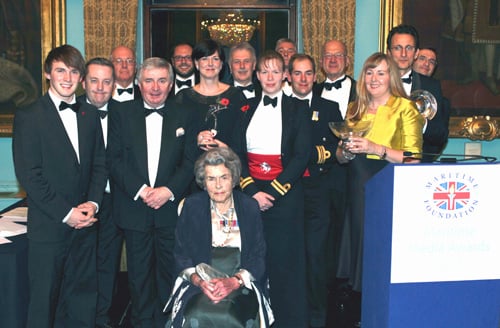 \
\
The awardees in Pall Mall
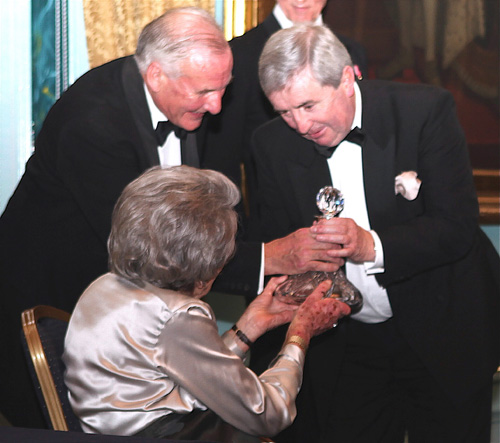
Tom MacSweeney receives the award from Countess Mountbatten
Read Tom MacSweeney's weekly 'Island Nation' blog HERE
Sea Songs and Shanties Make a Winning Combination
A wonderful weekend of maritime celebration took place in Rosses Point in August. It was the inaugural festival of Shanty and Seafaring organised by a local committee. The event took place over three days in the in the village which is steeped in seafaring history. As well as the singing readings and poetry, traditional Rosses Point events such as the "Go as you Please" and "Maugherow Cup" were hotly contested.
Many people from the village who lost their lives at sea were remembered in a special Mass and wreath laying ceremony at the "waiting on the shore" monument.
The total amount raised over the weekend through bucket collections, bbqs, and purchase of a specially commissioned CD by the local group Ashore for a Loaf, was a staggering €4434.00.
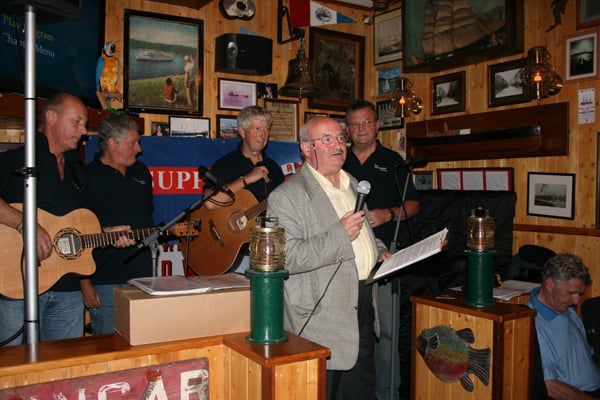
The Liverpool crew
The cheque was presented to the RNLI fundraising Chairman Pat Carter by Ann Mannion on behalf of the Shanty Festival Committee.In accepting the cheque Pat Carter congratulated the Shanty committee on a wonderful event and thanked them for their most generous donation to the RNLI. Pat Carter went onto thank the local people who as ever give very generously the RNLI Sligo Bay. The RNLI lifeboat service is funded entirely through voluntary donations.
The Committee have just announced that they will be holding an even bigger and better Shanty & Seafaring Festival in mid June 2011
Counting the Cost of New Fishing Boat Regulations
The cost of upgrading fishing boats to comply with new regulations first mooted three years ago means some boats cannot put to sea again. It's a move that will cost hundreds of jobs to coastal communities says Tom MacSweeney
The nation may be reeling from the revelations about Anglo Irish Bank and AIB. The fishing industry is reeling from another shocker. While earlier this week it cranked up its PR machine in an attempt to convince the public it was going to create jobs, the reality is that this Friday, October 1, it wiped out at least 200 and the overall effects of what it has done may throw as many as 800 people out of work in coastal areas.
That is callous disregard for people and underlines the disinterest and disrespect which the Government has for the maritime sector.
These jobs are in the fishing industry and are being lost because of a decision by the Department of Transport that smaller fishing boats, ranging in size from 15 to 24 metres must conform to the same safety standards as bigger boats, those over 25 metres, even though they operate under different fishing methods.
There can be no argument against safety, but there should be moderate, reasonable implementation of regulations. To quote the Taoiseach in his own recent defence, "moderation in all things." There are 99 boats in the Irish fleet in the 15-24 metre category. These are, effectively, day boats which operate in inshore waters, close to land. The Department has decided to implement regulations requiring them to conform to the same standards as bigger vessels that operate farther out to sea for extended periods.
Of the 99 boats nationwide faced with the implementation of the new regulations, 39 have not applied for certification, apparently because owners could either not afford the costs of upgrading the boats to the higher standard or felt the vessels would not be able to meet those standards, irrespective of how much money was spent on them. Those 39 boats have to be tied up, unable to go fishing any longer, another blow to the Irish fishing fleet. Their owners and crews will face unemployment.
The total number of jobs lost nationally could be up to 800, according to fishing organisations, when those whose livelihoods ashore depend on the 200 direct fishing jobs are added.
The Department makes the point that it has been known for three years that these new regulations would be imposed and that there has been ample time for owners to upgrade. Fishing organisations asked the Minister for Transport, Noel Dempsey, who also holds the brief of marine safety, to establish a separate category of safety requirements applying specifically to the smaller boats. Dempsey, who has not been a friend of the fishing industry, refused. So around 200 fishermen are out of work, directly due to a Government decision. It has not been explained why different regulations cannot be applied to different sizes of boats.
The sight of more Irish fishing boats tied to the quay wall, stopped by Irish Government regulations from working will not be pleasant.
• This article is reprinted by permission of the CORK EVENING ECHO in which Tom MacSweeney writes maritime columns twice weekly. Evening Echo website: www.eecho.ie




























